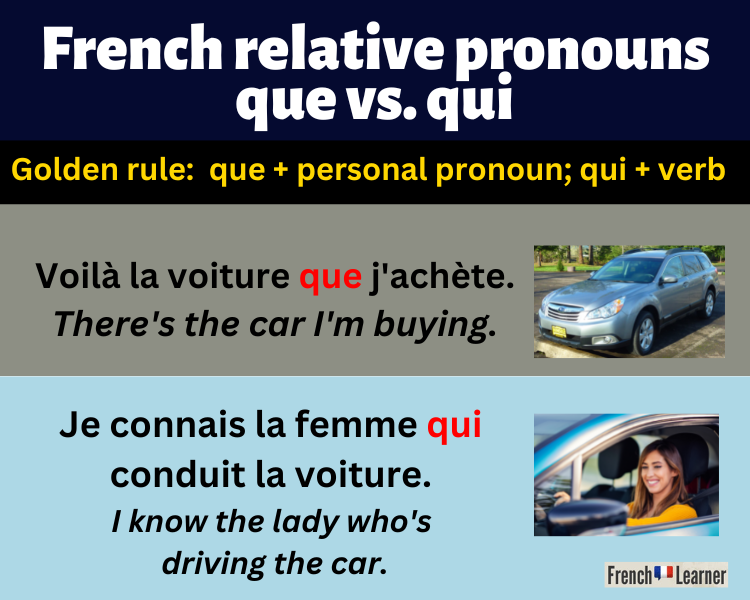The French relative pronouns are: qui (who, whom, which, that), que (who, which, that), lequel (that, which, whom), où (where) and dont (whom, whose, that, of which). This page will help you to master the French relative pronouns with clear and simple explanations.

French relative pronouns
Skip this section if you want to jump straigh into the example sentences.
A relative pronoun is a word that is used to link the second half a sentence to a previously mentioned person or thing. For example, “The man who works a lot or “”the bike that I use”.
In these sentences, “who” and “that” are relative pronouns. The man and the bike are “antecedents”, things being talked about.
The first part of these sentences are called the “main clause” and the second part of these sentences are called the “relative” or “dependant” clauses.
Relative pronouns que vs. qui

Que examples
The relative pronoun que translates to: Whom, which and that. Que is an object of the dependant clause.
- Le film que je regarde est fascinant. The movie that I’m watching is fascinating.
- La voiture que je conduis est rapide. That car that I’m driving is fast.
Qui examples
The relative pronoun qui translates to: who, whom, that, which and what. Qui is a subject for the dependant clause.
- J’écoute la personne qui parle. I’m listening to the person who’s speaking.
- Nous regardons le film qui commence à 17h00. We’re watching the movie which/that starts at 5pm.
Qui vs. que: How to decide
When trying to decided whether to use qui or que remember this simple rule: “qui + verb“, “que + personal pronoun or person”.
- La voiture qui est (qui + verb) rapide est dans le garage. The car that’s fast is in the garage.
- La voiture que je (que + personal pronoun) vais acheter est rouge. The car that I am going to buy is red.
Relative pronoun lequel
The relative pronoun lequel is used for verbs preceded by preposition including avec (with), sur (on), pour (for), sans (without), contre (against) and chez (at the home of).
Lequel has four forms (lequel, laquelle, lesquels and lesquelles) and must agree in gender and number with the antecedent (what’s being talked about).
| Masculine | Feminine | |
| Singular | lequel | laquelle |
| Plural | lesquels | lesquelles |
Combined with the prepositions lequel can mean “with which”, “for which”, “without which”, etc.
Lequel can refer to both people and things. When referring to people, qui can also be used:
L’homme pour lequel or pour qui je travail (The man for whom I work). However, qui is more commonly used than lequel in spoken French.
Examples with things only:
- C’est la maison dans laquelle j’habite. It’s the house I live in (in which I live).
- Voici l’ordinateur avec lequel je travaille. Here’s the computer I work with (with which I work).
Examples with people:
- C’est l’homme pour lequel / pour qui je travaille. He’s the man I work for (for whom I work).
With verbs followed by à and de, contractions occur with lequel. Agreement in gender and number must occur.
- à + lequel -> auquel
- de + lequel -> duquel
| Masculine | Feminine | |
| Singualr | auquel, duquel | à laquelle, de laquelle |
| Plural | auxquels, desquels | auxquelles, desquelles |
- L’examen auquel j’ai réussi a été très difficle. The exam that I passed was very difficult.
- a lettre de laquelle je parle est dans le bureau. The letter I’m talking about is the the desk.
Relative pronoun où
The relative pronoun où means both where and when.
In the following example sentence where referring to a place, où replaces a more formal dans laquelle.
- C’est la maison où j’habite. It’s the house where I live.
- C’est la maison dans laquelle j’habite. It’s the house where I live.
When referring back to times, dates, days, years, etc. when past events occurred, où is used to mean “when”.
- Je me souviens du jour où nous nous sommes mariés. I remember the day when we got married.
- Le jour où elle est partie, il a trouvé une autre femme! The day she left, he found another woman!
Relative pronoun dont
The relative pronoun dont refers back to people and things and used use for verbs or verbal expressions following by the preposition de.
- J’ai besoin de la voiture (I need the car) -> Voilà la voiture dont j’ai besoin (there’s the car I need).
- Tu parles du professeur (I’m talking about the teacher) -> Où travaille le prof dont tu parles? (Where does the teacher you’re talking about work?)

Indefinite relative pronouns
Indefinite relative pronouns are used when the antecedant (what’s being talked about) is unknown. The structure is “ce + relative pronoun“, to mean “what”.
Ce qui
- Je comprends ce qui est important. I understand what’s important.
Ce que
- Je ne comprends pas ce que tu dis. I don’t understand what you’re saying.
Ce dont
- Je sais ce dont tu as besoin. I know what you need.
Ce à quoi
- Je sais ce à quoi tu penses. I know what you’re thinking about.
Related lessons:
French grammar lessons | Lessons by David Issokson

